Pound hits fresh 15-month high as rally continues
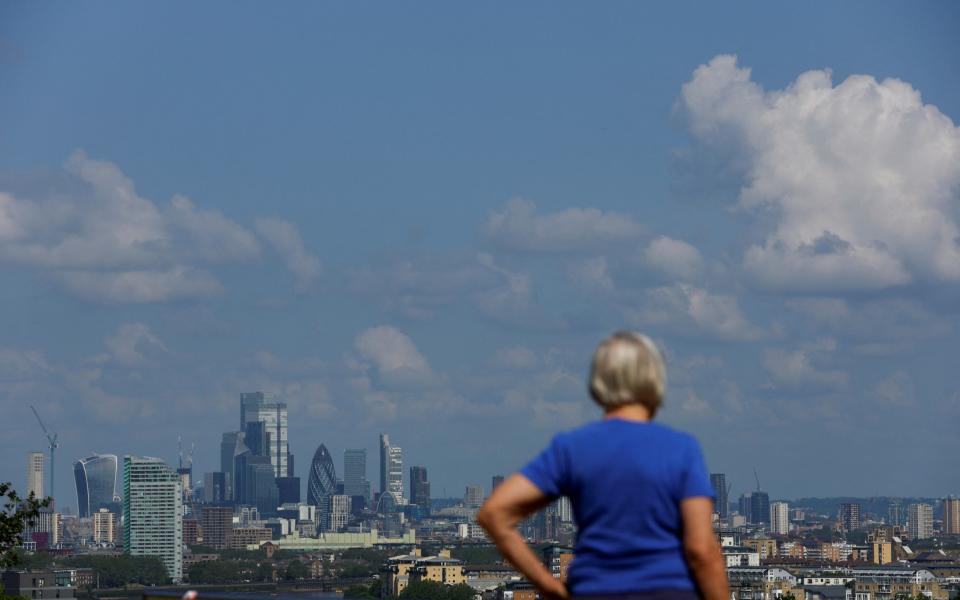
The pound has tipped above $1.31 for the first time since April last year after wholesale inflation in the US came to a near standstill.
Sterling has risen for a sixth session to a new 15-month high as it was also boosted by data showing the UK economy shrank by less than expected in May.
US producer prices barely rose in June from a year earlier, gaining 0.1pc in the smallest advance since 2020, according to the Bureau of Labor Statistics.
Traders have since reduced bets on the Federal Reserve increasing interest rates to combat inflation.
Meanwhile, the Office for National Statistics revealed Britain’s economy contracted 0.1pc in May, after growth of 0.2pc the previous month. Economists had expected a contraction of 0.3pc as businesses dealt with an extra bank holiday for the Coronation.
The pound has risen as much as 0.95pc today against the dollar and gained 0.3pc against the euro, which has pushed back toward its 11-month low of 85.05 pence touched on Tuesday.
Sterling had rallied 0.5pc on Wednesday as the dollar plunged in the wake of data which showed that US inflation rose 3pc in June, the smallest increase since March 2021.
Deutsche Bank strategists said they expect the dollar to continue to fall and predict that sterling will rise to $1.33 by the second quarter of 2024.
Chris Turner, head of markets at ING, said: “Many investors will now be targeting a move to $1.33.”
06:38 PM BST
That's all from us!
As always we’ll be back first thing tomorrow with the morning updates. Until then, columnist Tom Stevenson explains what the Nifty Fifty can tell us about today’s stock market leaders...
06:26 PM BST
China's weak zero Covid recovery means world will need less oil, says IEA
China’s weak economic recovery after the end of its draconian zero Covid policy will hold back demand for oil this year, according to the International Energy Agency (IEA).
Industry editor Howard Mustoe has the story:
The organisation has cut its forecast for oil consumption by 220,000 barrels a day as lacklustre Chinese growth and a worldwide rise in interest rates take effect.
It still expects demand to reach a record 102.1m barrels a day this year, up 2.2m on 2022.
Factory prices in China have fallen for nine straight months and consumer prices are on the brink of deflation because of a lack of demand, according to data released earlier this week. It suggests the country’s decision to end its strict Covid lockdown rules has failed to boost spending as much as hoped.
The IEA said: “China’s widely anticipated reopening has so far failed to extend beyond travel and services, with its economic recovery losing steam after the bounce earlier in the year.”
However, it still expects China to account for 70 pc of growth.
Consumption in Europe remains “anaemic”, the IEA’s report said, as economies across the continent struggle under high inflation.
It said: “Persistent macroeconomic headwinds, apparent in a deepening manufacturing slump, have led us to revise our 2023 growth estimate lower for the first time this year.
“World oil demand is coming under pressure from the challenging economic environment, not least because of the dramatic tightening of monetary policy in many advanced and developing countries over the past 12 months.”
Lower oil production in Saudi Arabia has been offset by higher output from Nigeria, Kazakhstan and Iran.
Separately, the Opec cartel of oil-producing countries said world consumption will rise by 2.2 million barrels a day next year to reach 104.3 million a day, about double the growth rate forecast by the IEA, with the cartel offering a rosier outlook for Chinese growth.
Earlier this week, the agency said that the world must step up mining for lithium, copper and other key minerals critical to global net-zero plans or risk missing its targets.
Car makers, solar panel makers and other industries driving the shift to carbon-free power also must find more diversified supplies rather than relying on big players like China and Australia, the agency said.
The market for the minerals, which also include nickel and cobalt, has already swelled to $320bn last year, and will grow further still, the IEA said in a report.
06:20 PM BST
Recruiter Hays suffers under falling job vacancies
Recruiter Hays has been hit by a plunge in permanent job vacancies.
The London-listed company said that total fees made from filling jobs has fallen 2pc in the past three months.
This reflected falling demand for permanent positions and longer hiring processes as economic uncertainty weighed down on the confidence of employers and job seekers, according to Hays.
However, Hays noted the positive effects of wage inflation and by raising its average recruiter fee for permanent roles by 10pc.
The FTSE 250 member warned that the incoming pipeline for permanent jobs is “modestly down” compared with the same period last year, and expects the hiring process will continue to lengthen.
The recruiter added that the modest slump in new vacancies for temporary positions is being offset by a rise in contract extensions.
06:03 PM BST
Ageing population means taxes must rise even further, warns OBR
The Government must find more than £100bn to keep the UK’s debt mountain from spiralling out of control, the budget watchdog has warned, suggesting that steep tax rises or spending cuts are on the horizon.
The Telegraph’s economics team has the details:
The Office for Budget Responsibility (OBR) said pressures from an ageing population, surging debt interest and the shift to net zero meant Britain’s £2.5 trillion debt pile was on course to soar in the coming decades.
Debt is expected to surge from 100pc of GDP today to more than 300pc within 50 years without spending cuts or tax increases.
The analysis highlights the stark choices facing Rishi Sunak or Labour leader Sir Keir Starmer after the next election. The Prime Minister had pledged to keep debt down even as some parts of the Conservative Party are demanding tax cuts to stimulate growth.
05:34 PM BST
Industrial miners lift FTSE 100 into the green
The FTSE 100 has ended in the green for the fourth day in a row, closing 0.32pc higher at 7,440.21.
The commodity heavy index was boosted by a 2pc rise in industrial miners as global metal prices appreciated on a softer dollar.
Glencore (share price up 2.47pc), Antofagasta (up 2.08pc) and Rio Tinto (up 1.71pc) were among the FTSE 100 risers.
The FTSE 250 midcap index closed 0.28pc higher at 18,631.71.
05:13 PM BST
BT hit with shareholder rebellion
BT has suffered a shareholder rebellion over concerns that one of its non-executive directors holds too many board positions.
Senior technology reporter James Warrington has the story:
More than 12pc of investors voted against the reelection of Allison Kirkby, who is seen as a possible candidate to replace chief executive Philip Jansen.
It comes after proxy advisory firm ISS urged investors to vote against Ms Kirkby’s reappointment on the basis of overboarding.
Ms Kirkby has served as chief executive of Swedish telecoms group Telia Company since 2020. She is also a non-executive director at Brookfield Asset Management.
Despite the rebellion, all 23 resolutions were voted through by shareholders at BT’s annual general meeting in Birmingham on Thursday.
The vote came days after BT confirmed that Mr Jansen will step down at an “appropriate moment” within the next 12 months.

05:03 PM BST
Allen & Overy boss resigns ahead of multibillion dollar merger
The chief of City law firm Allen & Overy has unexpectedly quit during its planned multibillion dollar merger with a US rival.
Gareth Price has resigned as global managing partner for “personal reasons” after more than three years in the position, Allen & Overy announced on Thursday.
His departure comes after Allen & Overy, one of London’s elite magic circle law firms, in May revealed plans to merge with New York-based firm Shearman & Sterling.
The combined firm will have around $3.4bn (£2.7bn) in combined revenue, as well as nearly 4,000 lawyers spread across 49 offices. The tie-up must still be approved by partners on both sides.
Global senior partner Wim Dejonghe said: “I want to express our gratitude for Gareth’s stellar contribution to A&O over the last 30 years.”
Allen & Overy also posted a 7pc increase in revenue to £2.1bn for the year to April 30, although warned of “intensifying” economic headwinds.

04:55 PM BST
Britain hit by collapse in foreign investment in life sciences amid surging NHS levy
Britain has been hit by a collapse in foreign investment in its life sciences sector amid spiralling NHS levy costs.
My colleague Hannah Boland has more:
Official government figures showed a 47pc slump in investment into life sciences companies by foreign groups last year, falling to an estimated £1bn from £1.9bn a year earlier.
This means Britain has slipped down the rankings of countries attracting foreign investment in the sector, with more cash being channelled into Ireland, Singapore and India.
It comes after warnings from the sector over Britain becoming less competitive for life sciences because of rising NHS fees. Under an NHS pricing agreement, pharmaceutical companies agree to help subsidise the cost of the health service’s drugs bill if it rises by more than 2pc.
The rate of how much companies are charged ultimately depends on how big the NHS’s medicines’ bill is and how fast it rises. However, the surge in drug costs during the pandemic caused this rate to jump. Pharmaceutical companies are facing a bill of £3.3bn as part of the NHS pricing agreement, up from the £563m in 2021.
Richard Torbett, chief executive of the Association of the British Pharmaceutical Industry, said: “When international markets turn away from you, it can be tough to turn things around.
”The industry has repeatedly warned that unless the UK addresses the excessive and internationally uncompetitive rebate rates, it cannot expect companies and investors to base themselves here.”
04:37 PM BST
Disney's share price surges after chief executive agrees to stay on until 2026
Disney’s share price is up 0.41pc to $90.49, making a swift recovery after after falling sharply at Wall Street’s opening bell.
It comes after chief executive Bob Iger announced yesterday evening that will remain in his position until the end of 2026.
The two-year extension gives the entertainment and theme park group further time to find a successor for Mr Iger, who was reappointed as chief executive after Bob Chapek stepped down last November.
Mr Iger previously served as Disney’s chief executive and chairman from 2005 to 2020 and then as executive chairman and chairman through 2021.
The Disney veteran said:
Because I want to ensure Disney is strongly positioned when my successor takes the helm, I have agreed to the board’s request to remain CEO for an additional two years.
The importance of the succession process cannot be overstated, and as the board continues to evaluate a highly qualified slate of internal and external candidates, I remain intensely focused on a successful transition.
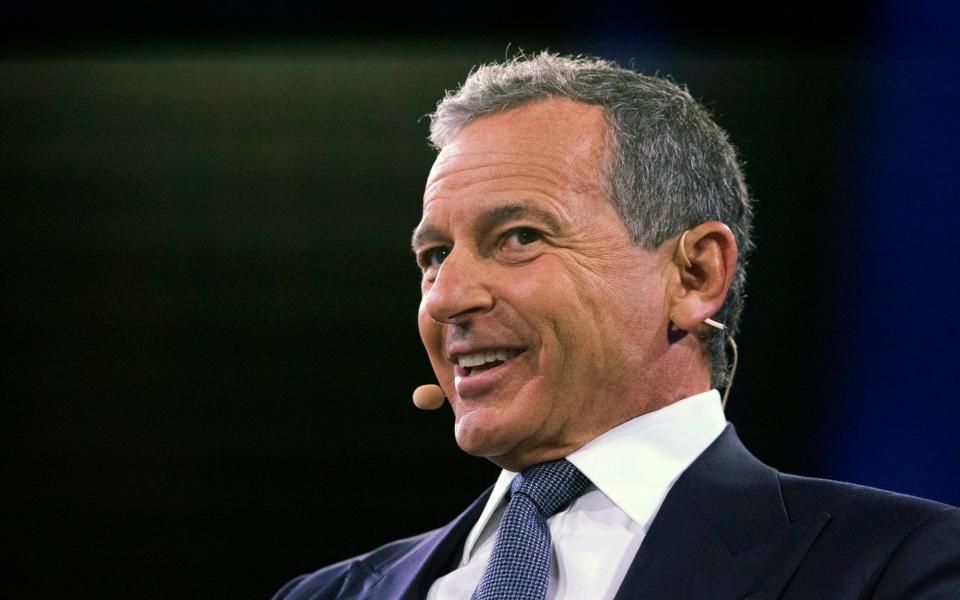
04:19 PM BST
Boost for savers as NS&I increases rates to 5pc
National Savings and Investments has increased returns on its one-year bonds to 5pc in a boost for millions of savers.
Personal finance reporter Alexa Phillips has the details:
The government-backed savings institution raised the interest rate on its Guaranteed Growth Bonds from 4pc to 5pc.
Savers who sign up for Guaranteed Income Bonds, another one-year account, will see their returns jump from 3.9pc to 5pc from Thursday.
However, the rates are still not market-leading, with rival banks offering up to 6.2pc, according to Moneyfacts, an analyst.
Some of the biggest high-street banks are also offering higher rates than NS&I on one-year deals, including HSBC and Lloyds.
NS&I also increased rates on its two-year and three-year Guaranteed Growth Bonds and Guaranteed Income Bonds to 5.1pc. These accounts are only available to existing customers who reach the end of their fixed term.
04:04 PM BST
Elon Musk criticises Federal Trade Commission 'overreach'
Billionaire Elon Musk has criticised the US’s consumer watchdog for going “absurdly far beyond” its legal powers.
FTC overreach has gone absurdly far beyond the legal mandate granted by Congress.
Weaponization of government agencies for censorship & political machinations needs to stop.— Elon Musk (@elonmusk) July 13, 2023
Twitter has asked a federal court to terminate a consent order from the Federal Trade Commission which restricts the social media company’s data security practices.
The 2011 agreement initially resolved allegations that Twitter failed to protect users’ information and has since required the company to bolster its privacy protection measures and information security.
In documents filed on Thursday, Twitter has asked the court to “rein in an investigation that has spiraled out of control and become tainted by bias, and to terminate a misfit consent order that no longer can serve any proper equitable purpose.”
Twitter claimed it has received 16 demand letters from the FTC since Mr Musk acquired the company last November, compared to the 28 issued in the past decade.
03:32 PM BST
Handing over
That’s all from me today. Adam Mawardi will take things from here.
I’ll leave you with this interesting chart, showing where Russia is getting its goods despite Western sanctions over its war in Ukraine:
China has become by far Russia's biggest trading partner. Whatever drop in exports there is from western countries is more than offset by the huge rise in China's exports to Russia. The surge in China's exports is one of the biggest pillars of support for Putin's war economy... pic.twitter.com/Z0eUvLwZ6l
— Robin Brooks (@RobinBrooksIIF) July 13, 2023
03:25 PM BST
Gas prices could halve this winter, says Morgan Stanley
Europe could see natural gas prices slump to around €15 this winter — about half the current level — in the event of a mild weather and weak demand, according to Morgan Stanley.
Prices could tumble to levels last seen before Russia invaded Ukraine “if weather is persistently warm and renewables perform strongly,” according to analysts including Martijn Rats.
That is at least one scenario envisioned by the bank after October, which it acknowledges is a tricky period to forecast.
At the other extreme, prices could surge to €100 if Europe freezes for a prolonged period and renewables do not provide sufficient relief.
Using a weighted average, they are more likely to be around €45, the analysts said.
Benchmark European gas prices are down 0.3pc today at less than €27 per megawatt hour.
03:14 PM BST
Shell 'considering sale of renewables businesses'
Shell is exploring options for its global renewable power operations, including a potential stake sale to outside investors, according to reports.
The UK energy giant is working with advisers to study a range of possibilities that could also include separating the business into a more independent unit, Bloomberg reported, adding it has approached a number of international investors to gauge their interest in buying a stake.
The deliberations come as chief executive Wael Sawan focuses the company’s investments on fossil fuels in a bid to increase shareholder returns and narrow the valuation gap with Shell’s US peers.
Discussions are still at an early stage, and there’s no certainty they will lead to a transaction, it was reported.
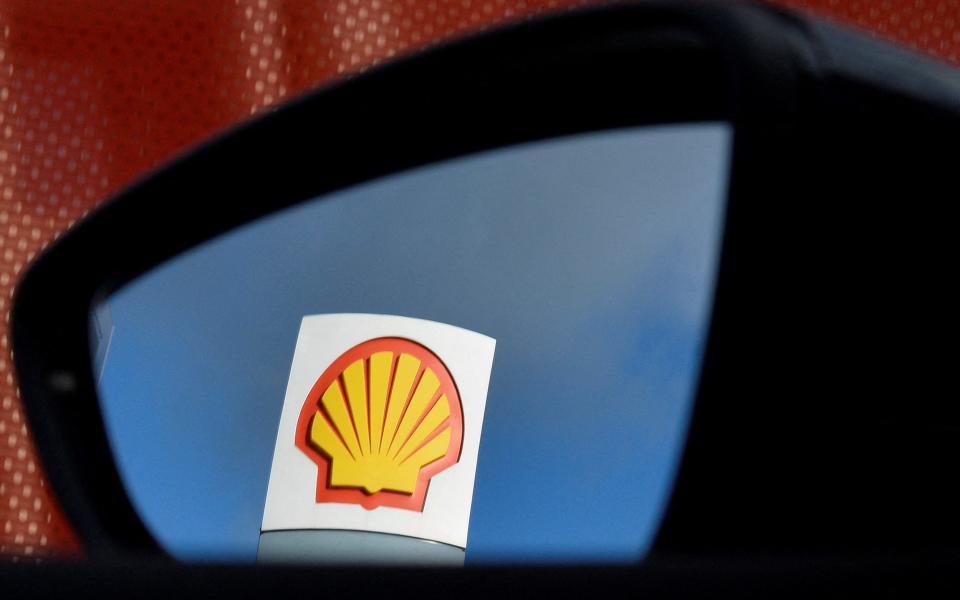
02:59 PM BST
ChatGPT investigated over fears it could ruin reputations with ‘made up stories’
US regulators are investigating the owners of ChatGPT over concerns that it has misused personal data and may compromise people’s reputations, in the biggest government challenge so far to the AI boom.
Our technology editor James Titcomb has the details:
The Federal Trade Commission (FTC) has sent San Francisco-based OpenAI a 20-page demand for information on how it handles safety and data, according to the Washington Post.
The agency is seeking records of complaints from users related to cases where ChatGPT has made “false, misleading, disparaging or harmful” comments about people.
It is also seeking details of where OpenAI collects its data and what safety assessments it makes before releasing new products to consumers.
Governments and regulators around the world are racing to get to grips with chatbots such as ChatGPT, which is believed to have more than 100m users, and Google’s Bard.
Read how so called large language models have faced scrutiny over producing false claims by “hallucinating” facts.
02:35 PM BST
US markets rise after opening bell
Wall Street’s main indexes opened higher after wholesale prices data provided further evidence of inflation cooling in the world’s largest economy.
The Dow Jones Industrial Average rose 0.2pc at the open to 34,412.31.
The S&P 500 opened higher by 0.4pc at 4,491.50, while the Nasdaq Composite gained 0.7pc to 14,021.15 at the opening bell.
02:19 PM BST
Pepsi prices fizz even as demand slumps
PepsiCo managed to boost its bottom line with higher prices even as it experienced lower demand for its drinks and snacks in the second quarter.
The New York-based company reported better-than-expected revenue and raised its full-year earnings forecasts.
Shares rose more than 2pc before the markets opened.
Snack food volumes fell 3pc in the April to June period, while beverage volumes dropped 1pc.
However, net pricing rose 15pc as the company reported a sixth consecutive quarter of double-digit price increases.
Pepsi’s revenue rose 10pc to $22.3bn (£17bn). That beat Wall Street’s forecast of $21.7bn, according to analysts polled by FactSet.
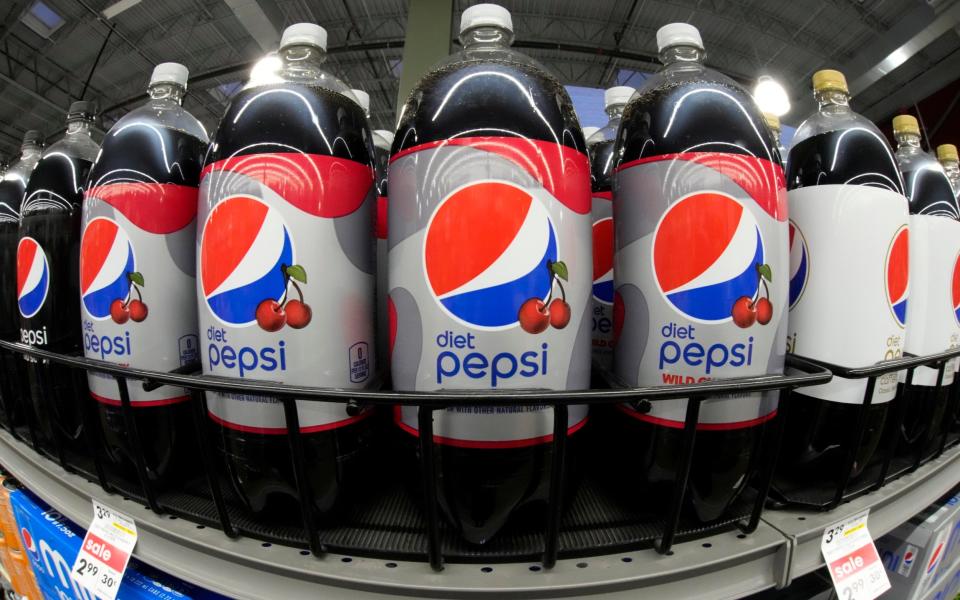
01:58 PM BST
Musk warns of ‘Terminator future’ in AI race as Zuckerberg prepares ChatGPT rival
Elon Musk has warned the world to be wary of a “Terminator future” for artificial intelligence as he unveiled his own AI start-up.
Senior technology reporter Matthew Field has the latest:
Mr Musk suggested that developers should not rush to develop advanced AI technology before fully understanding the implications of the new technology.
He told his followers on Twitter Spaces: “It’s important for us to worry about a Terminator future in order to avoid a Terminator future.”
The Tesla billionaire reiterated his calls for a pause on the global rush to develop the technology, saying: “If I could put a pause on AI or really advanced AI – superintelligence – I would. It doesn’t seem that is realistic.”
Read how Mr Musk’s rival Mark Zuckerberg is also pressing ahead with the development of his own AI product.

01:44 PM BST
Wall Street boosted by fresh inflation data
US stock indexes extended gains in premarket trading after producer prices data provided further evidence of inflation cooling in the world’s largest economy.
The Dow Jones Industrial Average was up 0.2pc, the S&P 500 gained 0.4pc, and Nasdaq 100 was up 0.8pc as the figures for wholesale prices stoked hopes that the Federal Reserve will soon end its monetary policy tightening..
Meanwhile, the number of Americans applying for jobless benefits fell again last week as the labour market continues to defy the Federal Reserve’s attempt to cool it by raising interest rates.
US applications for jobless claims fell by 12,000 to 237,000 for the week ending July 8, from 249,000 previous week, the Labor Department reported.
The four-week moving average of claims, which smooths out some of the week-to-week ups and downs, fell by 6,750 to 246,750.
Jobless claim applications are seen as a proxy for the number of layoffs in a given week.
Overall, 1.73m people were collecting unemployment benefits the week that ended July 1, 11,000 fewer than the previous week.
🇺🇸Dis-#inflation & near deflation in June
📉Headline #PPI: +0.1% m/m
📉Core: +0.1% m/m
✅Goods 0%
▶️Food -0.1%
▶️Energy 0.7% (⛽️)
▶️Core -0.2%👍
✅Services 0.2%
💥Transportation -0.9%
👍Trade (margins incl🚗)0.2%
🚨Inflation
⤵️PPI 0.1% y/y (-0.8pt)
⤵️Core 2.6% y/y (-0.2pt) pic.twitter.com/Uh3gWtTFT5— Gregory Daco (@GregDaco) July 13, 2023
01:35 PM BST
Wholesale inflation falls in US
US producer prices inflation slowed by more than expected in a further sign the world’s largest economy is turning a corner.
The figure fell to 0.1pc in June compared to forecasts of 0.4pc, having stood at 1.1pc the previous month, according to the Labor Department.
The reduction in the measure, which tracks the change in prices that domestic producers receive for their goods and services, will boost hopes that the economy is slowing down, negating the need for the US Federal Reserve to keep increasing interest rates to tame inflation.
01:21 PM BST
Sunak admits halving inflation 'more challenging'
Rishi Sunak has been holding a press conference after announcing the Government will accept the recommendations of the independent public sector pay review bodies.
The Prime Minister said the pay settlements - of around 6pc - will not be inflationary “because we are not borrowing to fund it”.
He added it was “not one big thing, just painstaking work” to look through budgets as part of a “reprioritisation” process.
He urged NHS consultants and junior doctors to accept the pay offer as he said strikes make it “far harder” for backlogs to be slashed.
Yet he also acknowledged that meeting his target of halving inflation was “more challenging,” although he refused to clarify if that target meant getting inflation below 5.4pc, 5.3pc or 5.2pc.
He said he made the announcement in January when the Government had figures for December inflation, which then stood at 10.5pc. That would imply his inflation target would be getting the number below 5.25pc.
01:12 PM BST
Wall Street on target to rise
US stock markets are expected to rise after the opening bell later following a sharp rally on Wall Street in the previous session as data showed inflation was cooling.
A slower rise in prices has boosted hopes that the Federal Reserve could soon end its monetary tightening campaign.
Investors are now looking ahead to producer price inflation data due an hour before markets open, which economists polled by Reuters expect to have eased to 0.4pc in the 12 months to June from 1.1pc in the previous month.
On Wednesday, the Nasdaq and the S&P 500 closed at over a year’s high, with megacap stocks leading gains after the CPI inflation report showed consumer prices registered their smallest annual increase in more than two years.
In pre-market trading, the Dow Jones Industrial Average was up 0.2pc while the S&P 500 had gained 0.4pc. The Nasdaq 100 was up 0.7pc.
01:03 PM BST
Cineworld hires new boss
Troubled cinema chain Cineworld said its lenders have appointed Eduardo Acuna as chief executive of the group as it prepares to emerge from bankruptcy.
Mr Acuna will work alongside new chairman Eric Foss as pat of an overhauled management team hired by lenders of the group.
Cineworld filed for Chapter 11 bankruptcy in the US last year after being weighed down by mammoth debts and weaker-than-hoped audience numbers.
It is pressing ahead with plans to restructure its roughly five billion US dollar (£3.8 billion) debt pile to allow it to exit bankruptcy, which is expected this month.
The world’s second largest cinema group said the search for more members of the newly formed board is ongoing.
Mr Acuna will replace Mooky Greidinger at the helm of the chain.
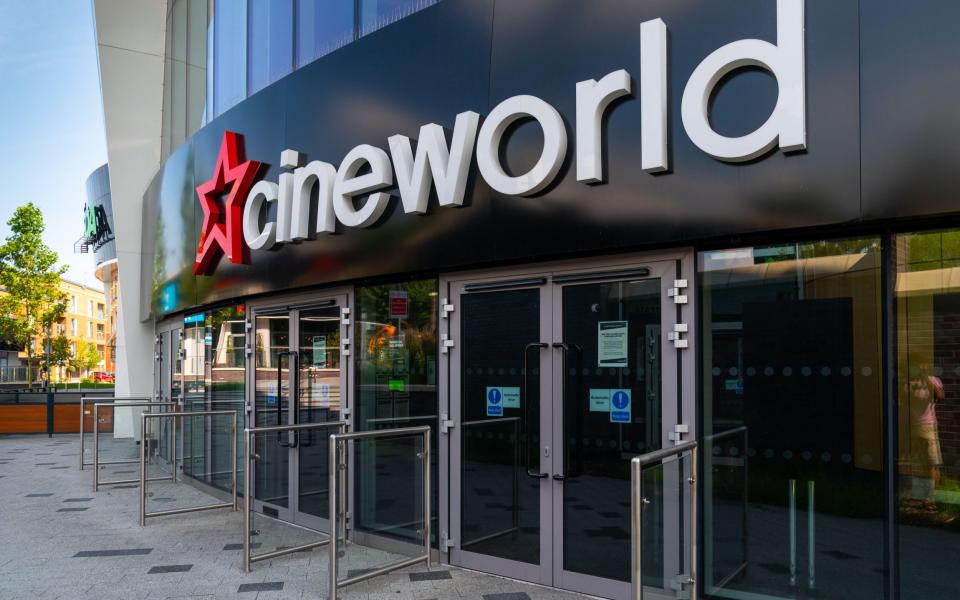
12:53 PM BST
Mortgage defaults jump at fastest rate since 2009
Mortgage defaults have surged at their fastest rate since 2009 as rapidly rising interest rates push more people into financial difficulty.
Economics reporter Melissa Lawford has the latest:
Bank of England data showed that the share of lenders reporting an increase in missed mortgage payments is now the highest it has been since the global financial crisis.
The proportion of banks reporting an increase in missed payments between April and June outweighed the number reporting a fall in defaults by a margin of 30.9pc.
Reports of defaults have more than doubled compared to at the start of the year, according to the Bank’s regular credit conditions survey.
Lenders warned that they expect defaults to continue rising over the summer.
Read how families are falling into financial difficulty after a rapid rise in housing costs.
12:24 PM BST
Million public sector workers to get pay rise of around 6pc
A million public sector workers will get a salary rise of around six per cent this year after Rishi Sunak agreed to accept the pay review body recommendations.
Doctors, teachers, prison officers and soldiers are among those who will benefit from the pay boost - but savings must be made from existing budgets, meaning squeezes must be found elsewhere.
The Prime Minister is set to reveal the decision this afternoon after signing off the move with Jeremy Hunt, the Chancellor, having returned from the Nato conference yesterday.
Follow the latest in our politics live blog.
NEW: A million public sector workers are set for a salary rise of around 6% after Rishi Sunak signed off the pay review recommendations
So teachers, doctors, police officers etc getting a bigger jump than Treasury initially wanted. But... that means savings to be found elsewhere— Ben Riley-Smith (@benrileysmith) July 13, 2023
12:17 PM BST
OBR report shows UK 'falling behind our peers,' says Labour
Labour said the Office for Budget Responsibility’s fiscal risks report demonstrates the Government will “never match the ambition” of the UK public.
Shadow chancellor Rachel Reeves said:
This report shows just how far we are falling behind our peers, how exposed our economy is, and again highlights that the Government is failing to take action in areas like energy security to help get bills down.
It tells you all you need to know that the cost of Government borrowing has risen faster in the UK than elsewhere in the G7 and faster than at any time in the last 40 years.
There are serious decisions to be made by this Tory Government to restore some security in our economy, to get a grip on inflation, and to stop people’s bills rising.
Instead, this new evidence and falling growth figures today show they will never match the ambition of the British people.
It’s time for them to step aside and let Labour restore our national economic and financial security, driven by our mission to secure the highest sustained growth in the G7.
12:12 PM BST
OBR report shows need for 'difficult but responsible decisions,' says Hunt
In response to the Office for Budget Responsibility’s fiscal risks and sustainability report (FRS), Chancellor Jeremy Hunt said:
In common with many advanced economies, the UK’s level of debt remains elevated following recent global shocks, including the pandemic and energy prices.
This highlights why it is important to deliver on the Prime Minister’s priority to get debt falling and to control borrowing to avoid adding inflationary pressures and risk prolonging higher inflation.
That means taking difficult but responsible decisions on the public finances, including public sector pay, because more borrowing is itself inflationary.
While the start of this century has seen an increased frequency of global shocks as outlined above, there are also a wider set of risks to the public finances that the Government needs to remain mindful of, which the OBR outlines in its fiscal risks register.
The Government will respond to the FRS at a subsequent fiscal event, to provide an update on the actions being taken to mitigate the risks identified by the OBR.
12:04 PM BST
Robo-taxis stalled as campaigners place cones on bonnet
This is one way to cause a road block. Driverless cars are being brought to a standstill in San Francisco as protesters against their expansion in the city place cones on the bonnet.
Members of SafeStreetRebel, a group of anonymous activists, have been putting traffic cones on the self-driving robotaxis to disable them.
A viral video has been showing people how to protest the spread of the vehicles, which are sparking anger for malfunctioning and blocking traffic.
Watch what is happening here:
11:52 AM BST
China has penetrated every sector of British economy, MPs warn
China has successfully penetrated every sector of the British economy and has effectively “bought” universities – but the Government has been slow to wake up to the “threat” posed by Beijing, MPs have warned.
Our deputy political editor Daniel Martin has the details:
Parliament’s intelligence and security committee said in a report the communist country’s ambition to become an economic superpower presents the “greatest risk” to the UK.
It said China’s state intelligence apparatus was “targeting” Britain and its interests “prolifically and aggressively”, and was seeking to control key industrial and civil nuclear energy assets.
The report said: “China’s size, ambition and capability have enabled it to successfully penetrate every sector of the UK’s economy.”
Read why the committee found that the Government’s response was “completely inadequate”.
11:36 AM BST
China's weak zero-Covid recovery means world will need less oil, says IEA
Global oil demand will not grow as fast as previously expected this year as China’s economic recovery is “losing steam” after ending zero-Covid restrictions, the International Energy Agency said.
World fuel consumption will increase by 2.2m barrels a day — or about 2pc — in 2023, a reduction of about 220,000 barrels from last month’s forecast, the Paris-based agency said.
Demand nonetheless remains on track to hit record levels later this year, draining storage facilities substantially in the second half. The IEA said:
World oil demand is coming under pressure from the challenging economic environment, not least because of the dramatic tightening of monetary policy.
Demand in the OECD, and Europe in particular, is languishing amid a grinding slowdown in industrial activity.
China’s widely anticipated reopening has so far failed to extend beyond travel and services, with its economic recovery losing steam after the bounce earlier in the year.
Brent crude has held above $80 a barrel in London today after passing the threshold for the first time in two months on Wednesday.
11:25 AM BST
Uniqlo owner boosts outlook as overseas sales rise
Uniqlo owner Fast Retailing raised its full-year forecast after reporting a surge in quarterly earnings that was driven by strong demand in overseas markets.
Operating profit for the 12 months through August will be ¥370 billion (£2bn), up from the outlook for ¥360bn issued in April, the Japanese company said.
That compares with the average analyst estimate of ¥363bn. It also raised the dividend by ¥30 to ¥280 (£1.60) per share for the year from April.
The maker of affordable, stylish clothing is diversifying its revenue streams from Japan and China to markets such as North America and Europe, where the outlook is relatively stable.
Fast Retailing is betting on North America and Europe to deliver annual revenue of ¥300bn and ¥500bn respectively, with an operating margin of 20pc, by 2027.
Sales for the Uniqlo brand overseas climbed 38pc in the latest quarter, while domestic sales rose 8.1pc. Operating profit for Uniqlo abroad jumped 90pc for the third quarter ended May, while Japan fell 5.7pc.

11:12 AM BST
Older, poorer and low-skilled workers make up 2.6m long-term sick
So who is within this group of 2.6m people inactive for health reasons in the UK?
Economics editor Szu Ping Chan has been analysing the numbers:
According to the OBR, they are older, poorer and previously worked in low-skilled jobs.
People aged between 50 and 64 years have accounted for around half of the post-pandemic rise in long-term sickness, even though they make up less than a third of the working age population, according to the watchdog.
They have been signed-off mainly for mental health reasons, which account for around half of the total rise in health-related inactivity since the pandemic.
Musculoskeletal conditions are the second most cited condition.
In terms of qualifications, most have either no qualifications or A-levels and below, and have previously worked in lower-paid roles.
The OBR says the largest increases in health-related inactivity are “among those who had previously worked in caring, leisure, and other services; sales and customer services; and elementary occupations (such as cleaners and hospital porters).”
11:01 AM BST
UK debts more exposed to rate rises, says OBR
The way the Government funds its £2.6trn national debt is critical for the stability of the public finances. But the OBR warns that things do not look so strong and steady today.
Deputy economics editor Tim Wallace explains here:
Traditionally, the UK had a very long debt maturity - it locked in borrowing for far longer than most other nations, providing extra stability to the finances.
However, today the average maturity has fallen to the shortest on record because the Bank of England has snapped up one-third of the Government’s debt through its quantitative easing (QE) programme, replacing long-term bonds with Bank reserves which pay the base rate, providing no long-term security at all.
The OBR calculates this has taken the average maturity of the public sector’s liabilities down from seven years in 2008 to two years today.
“This leaves the UK public finances much more exposed to the sudden rise in interest rates we have witnessed over the past year,” the OBR said.
Government debt levels have tripled since the start of this century. Despite all Chancellors since 2010 aiming to get debt falling, at 100 per cent of GDP, debt is at its highest level in over 60 years#OBRfiscalrisks pic.twitter.com/0MBmuJug65
— Office for Budget Responsibility (@OBR_UK) July 13, 2023
10:55 AM BST
US regulators confirm appeal against blocking of Microsoft-Acitivision deal
Away from the OBR for a moment, US regulators have confirmed they will appeal against Microsoft’s $69bn (£53bn) takeover of games maker Activision after an attempt to block the deal was thrown out by a judge on Tuesday.
Senior technology reporter Matthew Field has the details:
The Federal Trade Commission will lodge an appeal against a ruling by a California court to block a preliminary injunction of the deal. Judge Jacqueline Scott Corley ruled the regulator had failed to show the takeover of Call of Duty maker Activision was unfair, and argued it could even boost competition.
Brad Smith, Microsoft’s president, said: “We’re disappointed that the FTC is continuing to pursue what has become a demonstrably weak case, and we will oppose further efforts to delay the ability to move forward.”
The FTC is expected to reveal the thinking behind its appeal today. If it fails to gain the approval of the court, Microsoft and Activision are expected to finalise the merger as soon as next week.

10:42 AM BST
Triple lock will add £27bn to state pension, says OBR
The OBR has blamed the Government’s commitment to the triple lock for a £23bn-a-year increase in state pension spending by 2027 relative to the start of the decade.
Economics editor Szu Ping Chan has the latest:
A promise to raise annual state pension payments by the highest of inflation, average earnings or 2.5pc had “left the public finances exposed to higher pension costs,” the OBR said.
It lifted pensions by 10.1pc this year to match increases in the cost of living.
A wave of baby boomers retiring in the next few years was the other driver of a big jump in costs.
The OBR warned that the cumulative effect of higher spending in every year because of the triple lock on pensions will add a massive 36pc of GDP to Britain’s debt pile debt by 2072-73.
10:38 AM BST
UK faces threat of future gas spikes, says OBR
Britain risks being exposed to gas price shocks for decades to come, as its response to the invasion of Ukraine was to import more LNG from countries including the US, as Europe cut back on Russian supplies.
Deputy economics editor Tim Wallace has the latest:
Unlike France, Italy and Germany, the UK has cut back on renewables investment, raising the risk of even longer-term reliance on gas, the OBR said.
As a result we remain vulnerable to more price shocks.
“Continuing our dependence on gas at the current level could, in an adverse scenario, be as expensive fiscally as completing the transition to net zero,” the watchdog said.
If big energy shocks take place every decade and the Government supports households with the cost as they did last year, “these shocks could cost the Exchequer between 2pc and 3pc of GDP per year,” the OBR said.
“Taking account of additional debt interest costs and the impact on economic activity, such recurring gas price spikes would add around 13pc of GDP to public debt by 2050-51. This is about twice as much as the 6pc of GDP central estimate for the total cost of public investment to complete the transition to net zero by the middle of the century.”
Our risk register contains 57 risks to the UK public finances. Since 2021, 15 have increased including cost pressures on health and social care, increased spending on the state pension, and the delayed transition to net zero. Only 4 have decreased and 2 have been resolved/removed pic.twitter.com/pLD7KtLrsa
— Office for Budget Responsibility (@OBR_UK) July 13, 2023
10:32 AM BST
UK public finances on ‘very risky’ footing, says OBR
Britain’s public finances are likely to remain on a “very risky” footing after a series of shocks including the pandemic, the war in Ukraine and a deep cost-of-living crisis, the Treasury’s official spending watchdog has said.
The Office for Budget Responsibility has set out how the Government’s finances are expected to be strained in the coming years as it recovers from those events.
It has estimated that state pension costs will rise £23bn, or by 0.8pc of gross domestic product, by the 2027-28 fiscal year when compared with the start of the decade.
It added that the spread of electric vehicles will drain £13 billion a year in fuel duties from the Treasury by 2030 while public investment to support the shift to net zero emissions may cost £17 billion a year by then.
Defense spending may rise by £13bn a year in today’s terms — to 2.5pc of GDP from 2oc — to meet growing security threats in Europe and Asia.
It said that recent events had pushed government borrowing to its highest level since the mid-1940s, the stock of government debt to its highest level since the early 1960s, and the cost of servicing that debt to its highest since the late 1980s.
Government debt levels have tripled since the start of this century. Despite all Chancellors since 2010 aiming to get debt falling, at 100 per cent of GDP, debt is at its highest level in over 60 years#OBRfiscalrisks pic.twitter.com/0MBmuJug65
— Office for Budget Responsibility (@OBR_UK) July 13, 2023
10:25 AM BST
NHS waiting lists not main driver of long-term sickness, says OBR
NHS waiting lists are not primarily to blame for big rise in long-term sickness, the OBR has said.
Economics editor Szu Ping Chan has the latest:
The number of people in England waiting to start hospital treatment has hit a fresh record of almost 7.5m, new NHS figures show.
However, OBR analysis suggests that only a “relatively small proportion of those inactive for health reasons are on the NHS waiting list”, and estimates that even halving the list over the next five years would only reduce working-age inactivity by around 25,000.
There are currently 440,000 people outside the workforce for health reasons.
The OBR said: “While the disruption to and difficulties in accessing NHS services may have played a role in the worsening physical and mental health of the working-age population during this period, tackling the NHS waiting list alone is likely to make only a modest difference in the number of people out of work.
“We estimate that halving the NHS waiting list over five years – returning it to its mid-2015 level of around 3.5 million – would only reduce working-age inactivity by around 25,000.”
The OBR also highlighted that the “vast majority of those currently inactive for health reasons have been out of work since before the pandemic”, with 1.5m of the working-age inactive population “out of work for more than three years, and 560,000 23 per cent)have never had a job.”
10:20 AM BST
UK public finances in ‘very risky’ position as benefits surge, says OBR
Long-term sickness has added £6.8bn to the annual benefits bill, the Office for Budget Responsibility (OBR) has warned, as the number of inactive workers has surged since the pandemic.
The Government’s fiscal watchdog said that a sustained rise in the number of people out of work due to illness threatened medium-term economic growth prospects by putting pressure on health and welfare spending.
It said these workers, who number around 440,000, were claiming an average £10,000 a year each, adding £6.8bn to the welfare bill in the 2023 to 2024 tax year and taking the total number of people inactive for health reasons to 2.6m.
They have also cost £8.9bn in foregone tax receipts, and added £15.7bn to annual borrowing, which is equivalent to 0.6pc of GDP, the OBR warned in its fiscal risks and sustainability report.
The watchdog said that Britain’s public finances are likely to remain on a “very risky” footing after a series of shocks including the pandemic, the war in Ukraine and a deep cost-of-living crisis.
It added that the fallout from those shocks and the deepest recession in three centuries will resonate for years and impact the Government’s ability to deliver services.
09:56 AM BST
Trustpilot shares surge as review website expects profit
Shares in Trustpilot have surged as much as 19pc after the online review website raised its profitability outlook and revealed an 18pc jump in revenues in the last six months.
The Copenhagen-based company said it expects to report adjusted first-half core earnings of $3m (£2.3m) compared with a loss of $5.4m a year earlier amid a 16pc growth in bookings on a constant currency basis in the six months to the end of June.
Bookings were up 15pc in the UK and 21pc in Europe and the rest of the world, prompting JP Morgan to declare the stock “overweight,” meaning the investment bank expects the shares to outperform the market.
09:41 AM BST
Pound pushes higher as traders cut US interest rate bets
The pound has continued its push upwards as US inflation data indicated the world’s largest economy may begin to ease its level of interest rates soon.
Sterling has climbed 0.5pc against the dollar to fresh 15-month highs of $1.305 as traders increased bets on the Federal Reserve’s Federal Open Market Committee (FOMC) cutting rates early next year.
The pound has gained 0.2pc verses the euro, which has fallen back towards 85p.
City Index markets strategist Fiona Cincotta said:
A lot depends on what we hear from the FOMC in a couple of weeks - that will very much decide the fate of the US dollar and set the tone for the rest of the summer.
If there is any hint of dovishness in the Fed, then the dollar bears are going to jump on that and it will be an excuse to continue grinding the dollar lower.
09:25 AM BST
Virgin Media investigated as customers 'struggle to leave'
Virgin Media will be investigated by regulators over complaints from customers that it is too difficult to cancel their services.
Ofcom said it is “concerned” about the number of complaints received from consumers who reported a number of issues when they tried to leave the company.
Some said they had struggled to get through to an agent on the phone, some found their call was dropped mid-way through or were put on hold for long periods.
Many said they had to make lengthy and repeated requests to cancel, as their initial request was not carried out.
Ofcom said it would examine whether Virgin Media has complied with its contract termination rules, and see if it has failed to meet the watchdog’s requirements on complaints handling.
It said it would gather further information and provide updates as its investigation progresses.
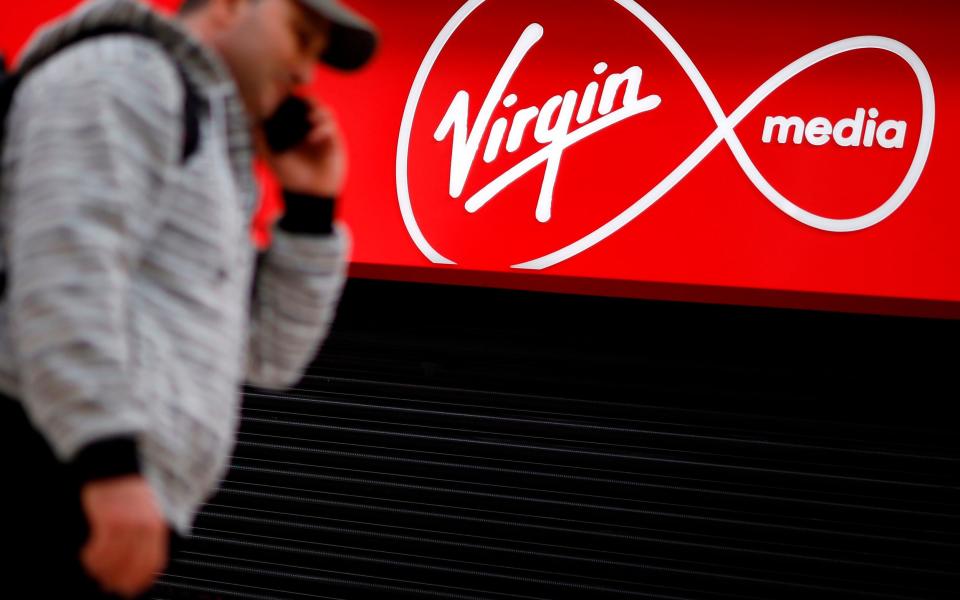
09:04 AM BST
Watches of Switzerland shares tick higher as demand increases
Watches of Switzerland shares jumped after the biggest retailer of Rolex watches in the UK said demand for luxury timepieces is still solid despite price increases by some of the biggest brands.
Waiting lists for the most in-demand timepieces are increasing and average selling prices are growing, chief executive Brian Duffy said.
The shares rose as much as 12pc after it reported sales of £1.5bn for its financial year ended April 30. The company also reiterated its forecast for 2024.
It comes as Swiss watch exports have continued to increase in 2023 after reaching a record of more than 24bn francs (£21.3bn) in 2022.
China’s reopening has offset concerns about slowing demand in the US, the biggest market for luxury timepieces.

08:49 AM BST
Barratt to cut home builds as rising mortgage rates hit demand
Barratt Developments has warned of a slump in house builds as it said cost-of-living pressures and rising mortgage rates were impacting homebuyer demand.
The housebuilding giant is forecasting its build completions to tumble by as much as 23pc over 2023-24, to between 13,250 and 14,250 in 2023-24.
Prices for private sales in its forward order book have also dropped sharply, down 8.7pc at £342,900 on average, partly down to the group’s use of incentives to boost demand.
The housing market is being hit by surging mortgage costs, with average two-year fixed mortgage rates jumping to a 15-year high of 6.7pc earlier this week as interest rates keep rising to combat stubbornly high inflation.
Halifax recently said house prices fell at their fastest annual rate in 12 years last month, down 2.6pc at £285,932.
Barratt saw demand tail off after last October’s mini-Budget market chaos sent mortgage rates soaring, before recovering a little in its third quarter, though it said reservations “slowed more than normal seasonal trends” from mid-May to the end of June.
Its weekly net reservations per outlet dropped to 0.55, against 0.88 the year before, while completions slumped 12.8pc in the six months to June 30, taking its overall for the year down 3.9pc to 17,206.
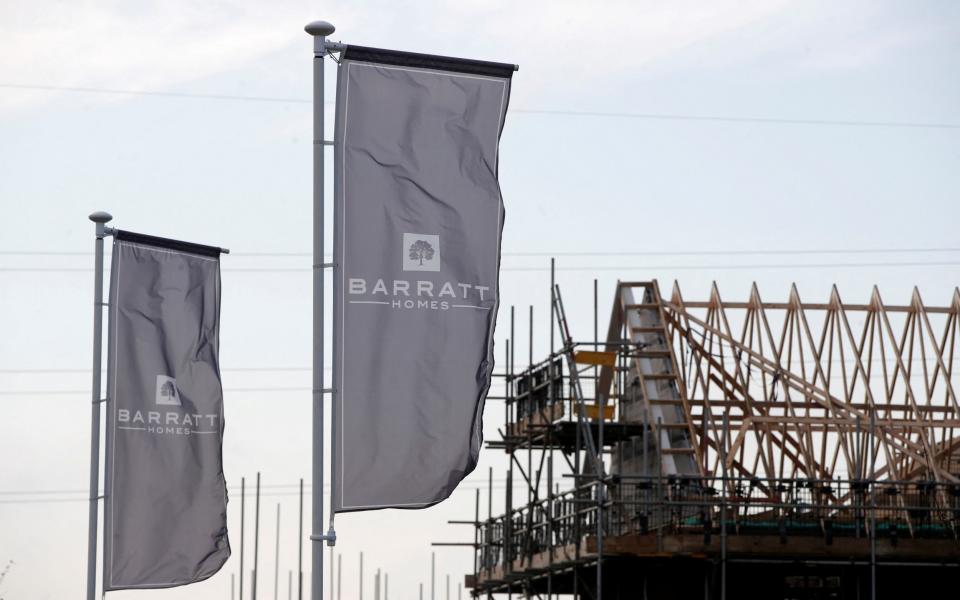
08:31 AM BST
Markets subdued in hangover from year's biggest surge
The FTSE 100 was subdued at the open as gains in energy stocks outweighed losses in financials, following its largest single-day gain of the year on Wednesday.
The blue-chip index held steady at 7,416.43 points after making its biggest one-day jump since last November amid as US inflation fell to 3pc - its lowest level in more than two years.
The more domestically focussed FTSE 250 midcap index was also flat after a 2.4pc surge on Wednesday, its largest gain since February.
Barratt Developments has slipped 4.9pc after Britain’s largest homebuilder said it would build far fewer homes this fiscal year.
The broader homebuilders index fell 2.4pc.
Separately, an industry survey showed signs of a slowdown in Britain’s housing market in June, and property surveyors expect activity to remain subdued as higher borrowing costs hit new buyer enquiries.
Heavyweight energy stocks rose 0.2pc, tracking higher crude prices.
UK banks fell 0.6pc after rising nearly 3pc in the previous session.
The pound was also trading higher after official data showed Britain’s economy contracted by less than expected in May.
08:18 AM BST
Pay disputes prove 'why growth is so important' says Truss-backed economist
The Government’s battle to find the funds to pay striking workers as the economy shrinks proves “why growth is so important,” according to the head of a new international task force launched by former prime minister Liz Truss.
The UK economy shrank 0.1pc in May although this was less than the 0.3pc contraction economists had expected following rail and school strikes - and the extra holiday for the Coronation.
Shanker Singham, co-chair of the Growth Commission, said:
Low or no growth and the inevitable toss up between pay increases and service cuts. This is all why growth is so important.
With growth, with a bigger pie, you can support proper pay without having to impact services.
You can put more money in people’s pockets and the Government coffers. It has to be the primary focus of policymakers.
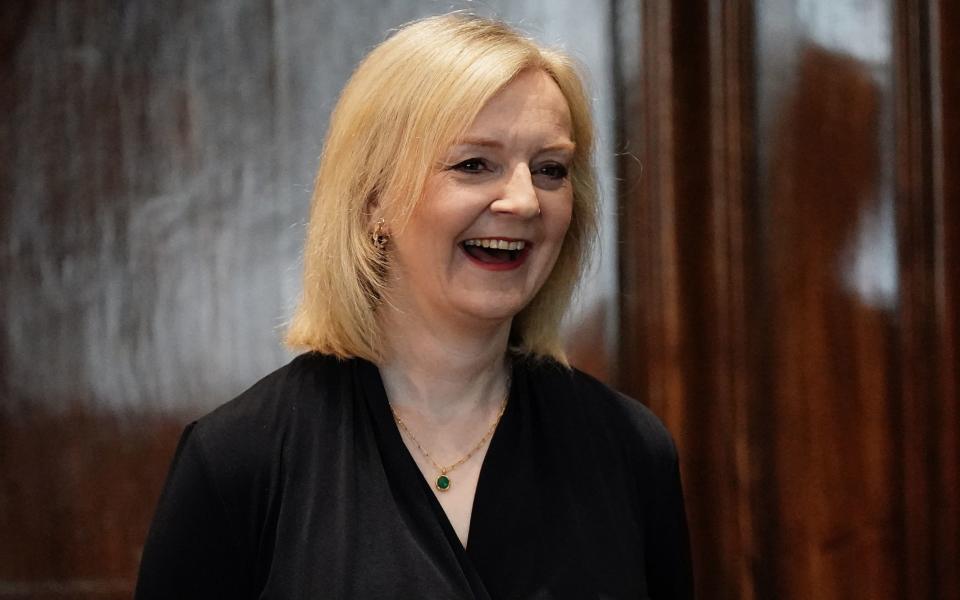
08:06 AM BST
FTSE 100 tepid after economic data
UK stock markets appear unsure how to interpret the latest economic data from the Office for National Statistics.
The FTSE 100 was flat at 7,415.76 after the open while the midcap FTSE 250 was little changed at 18,571.40.
The UK’s blue-chip stock index enjoyed its largest single-day gain since November on Wednesday after US inflation fell to its lowest level in two years.
07:58 AM BST
Bank of England 'may take some comfort' from weaker growth, says IoD
Kitty Ussher, chief economist at the Institute of Directors, said the slight fall in GDP could be a source of encouragement for the Bank of England, showing signs that higher interest rates are beginning to slow demand. She said:
The ONS GDP data for May is consistent with our own survey data that shows confidence flatlining in May after growth in the earlier part of the year.
Looking at the detail, a large 3.5pc monthly fall in ‘employment activities’ within the service sector is further evidence that the labour market is now cooling, leading to lower demand for the services offered by recruitment companies.
Perhaps perversely the Bank of England may take some comfort from this weaker output data, as it suggests demand may be cooling, which in turn reduces inflationary pressure.
07:49 AM BST
'Bigger picture remains weak' on UK economy
Economist Julian Jessop is not feeling positive after reading the latest ONS figures:
UK #GDP fell 0.1% in May, which was not as bad as expected: hit from the extra Bank Holiday partly offset by rebound in healthcare (fewer NHS strikes).
But bigger picture remains weak: no growth in the three months to May, and monthly GDP just 0.2% above its pre-covid level. pic.twitter.com/7H2fn5M154— Julian Jessop (@julianHjessop) July 13, 2023
07:45 AM BST
UK economic data 'paint a confused picture'
The outlook for the UK economy is unclear following the latest data from the ONS, investors have said.
Nicholas Hyett, investment manager at Wealth Club said:
May’s GDP numbers paint a confused picture of the state of the economy.
While the economy shrank modestly in May, that could be down to the extra bank holiday for the Coronation as well as industrial action across the health, rail and education sectors.
If true that would suggest the underlying picture is of an economy that remains strong, despite the Bank of England’s attempts to cool activity with higher interest rates.
Longer term though, there are signs the economy could be running out of gas.
The housing market seems to be slowing, with less construction activity in housebuilding, and recruitment is seeing weakness too – potential canaries in the coal mine that suggest the economy has reached a turning point and is sliding from growth to contraction.
We suspect the Bank will take no chances and continue to hike rates, but the job of balancing inflation and economic growth isn’t getting any easier.
07:35 AM BST
Real GDP will grow in second quarter, economists predict
The contraction in the economy in May “isn’t as bad as it looks” according to economists, with the UK on course to beat Bank of England estimates about the economy.
Paul Dales, chief UK economist at Capital Economics, said real GDP is on track to rise by around 0.1pc from April to June, compared to the previous three months, which would beat the Bank of England’s 0pc forecast for the second quarter in a row. He said:
Overall, the bank holiday and strikes make it hard to judge the true health of the economy.
But our sense is that underlying activity is still growing, albeit at a snail’s pace.
We suspect that real GDP rose by around 0.1pc in the second quarter as a whole, compared to the previous three months, but that the effect of the further surge in mortgage rates since mid-June will contribute to GDP falling in Q3 and a mild recession beginning.
That may not prevent the Bank from raising interest rates from 5pc now to 5.25pc or 5.5pc, but it may mean rates don’t rise as far as the 6pc to 6.25pc priced into the market.
07:28 AM BST
Pressure 'firmly' on Bank of England to keep raising interest rates
As the UK economy performed better than economists had expected, Premier Miton’s chief investment officer Neil Birrell said:
As expected, the UK economy shrank in May, but not as much as expected.
Admittedly, we are a month on from that now and the economy could be weaker still, but this would not have been the picture the Bank of England wanted to see.
With inflation still rife, this keeps the pressure firmly on the Bank to keep raising interest rates, putting even more pressure on the consumer in particular.
07:18 AM BST
Industries 'impacted by one fewer working day than normal,' says ONS
Darren Morgan, director for economic statistics at the ONS, said:
GDP fell slightly as manufacturing, energy generation and construction all fell back with some industries impacted by one fewer working day than normal.
Meanwhile, despite the Coronation bank holiday, pubs and bars saw sales fall after a strong April. Employment agencies also saw another poor month.
However, services were flat overall with health recovering, with less impact from strikes than in the previous month, and IT also had a strong month.
Across the last three months as a whole the economy showed no growth.
GDP fell 0.1% in May 2023.
▪️ Services were flat (0.0%)
▪️ Production fell 0.6%
▪️ Construction fell 0.2%
➡️ https://t.co/Z94htJo1G0 pic.twitter.com/oeYBJNy5id— Office for National Statistics (ONS) (@ONS) July 13, 2023
07:15 AM BST
Inflation 'remains drag anchor' on economy, says Hunt
Chancellor of the Exchequer, Jeremy Hunt said:
“While an extra Bank Holiday had an impact on growth in May, high inflation remains a drag anchor on economic growth.
“The best way to get growth going again and ease the pressure on families is to bring inflation down as quickly as possible.
Our plan will work, but we must stick to it.”
07:10 AM BST
Economy shrinks as Coronation hits growth
The UK economy shrank in May amid ongoing public sector strikes and the extra bank holiday to celebrate the Coronation of King Charles.
The Office for National Statistics (ONS) said the monthly contraction of 0.1pc followed growth of 0.2pc in April.
However, this was better than the 0.3pc decline expected by analysts as families used the additional bank holiday to spend on concerts, museum trips and other recreational activities.
This means growth across the three months to May was flat. Darren Morgan, director of economic statistics at the ONS, said there were further signs that the jobs market was cooling, with employment agencies seeing “another poor month”.
He said manufacturing, energy generation and construction all saw declines, “with some industries impacted by one fewer working day than normal”.
He added that “despite the Coronation Bank Holiday, pubs and bars saw sales fall after a strong April.”
Strike action by rail workers hit visits to bars and restaurants, the ONS said, though no industrial action by junior doctors in May compared with four days in April helped to boost output in the health sector following a big drag the previous month.
Chancellor Jeremy Hunt said inflation, which stood at 8.7pc in May, was still far too high: “While an extra Bank Holiday had an impact on growth in May, high inflation remains a drag anchor on economic growth.
“The best way to get growth going again and ease the pressure on families is to bring inflation down as quickly as possible. Our plan will work, but we must stick to it.”
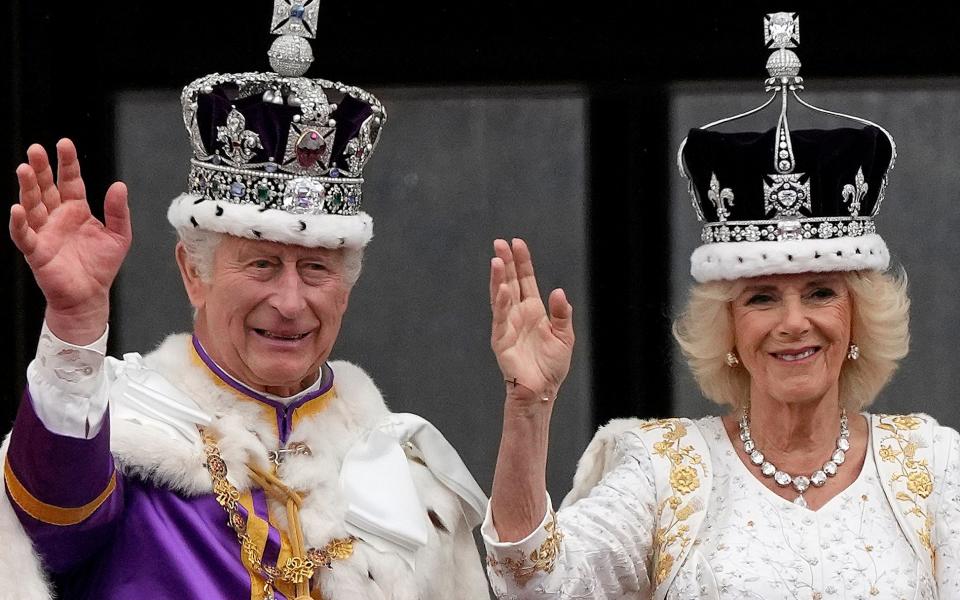
07:05 AM BST
Good morning
Britain’s economy shrank in May as the extra bank holiday for the King’s coronation impacted growth.
Gross domestic product (GDP) fell by 0.1pc, according to the Office for National Statistics.
5 things to start your day
1) US inflation slumps to two-year low piling pressure on Bailey to tame prices | Economists said the drop in US prices showed that the Federal Reserve is succeeding in its battle to rein in costs, raising hopes that the Bank of England may be able to replicate its efforts.
2) Race to rewild Britain is putting food security at risk, farmers say | Landowners concerned that Government lacks focus on agricultural production
3) ‘Big mistake’ for brewers to weaken beer, Wetherspoons boss warns | Brands such as Spitfire Ale and Old Speckled Hen have cut the drinks’ alcohol content
4) Boards with women and minorities get more attacks from hedge funds, finds study | Companies with diverse boards more vulnerable to activist assaults, academics claim
5) Russia launches Wikipedia rival in new censorship crackdown | Kremlin-approved service created amid growing signs of discontent over war
What happened overnight
Asian stocks rallied as cooling US inflation strengthened the view that the Federal Reserve’s monetary tightening cycle is nearing an end. The dollar and Treasury yields extended declines.
An Asian share gauge headed for the highest close in more than three weeks, supported by gains in Hong Kong, Australia and Japan.
Sony climbed more than 5pc in Tokyo after Goldman Sachs upgraded its recommendation to buy from neutral.
Japan’s Topix index rose 1.1pc while Hong Kong’s Hang Seng Index rose 2.5pc. China’s Shanghai Composite Index was up 0.9pc and Australia’s S&P/ASX 200 Index gained 1.4pc.
Wall Street stocks advanced on Wednesday after new inflation data showed a slowdown in the rampant rise of US consumer prices, fuelling bets that the Federal Reserve is nearing the end of its rate-hiking cycle.
The Dow Jones Industrial Average rose 0.4pc to 34,403.46, the S&P 500 gained 0.8pc to 4,476.12 and the Nasdaq Composite added 1.1pc to 13,917.37.
The benchmark 10-year Treasury yield fell to 3.85pc from 3.98pc late Tuesday. The two-year Treasury yield dropped to 4.74pc from 4.89pc.

 Yahoo Finance
Yahoo Finance 